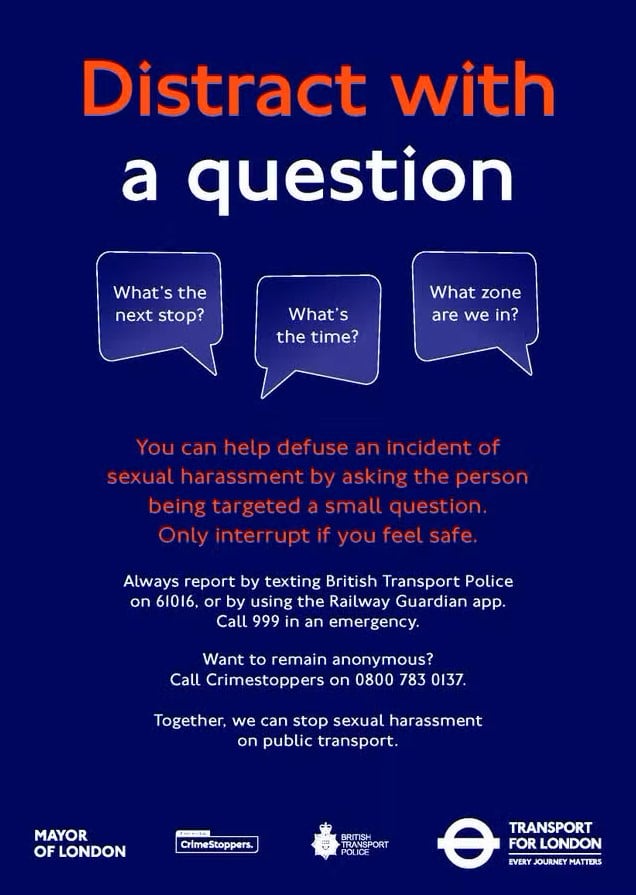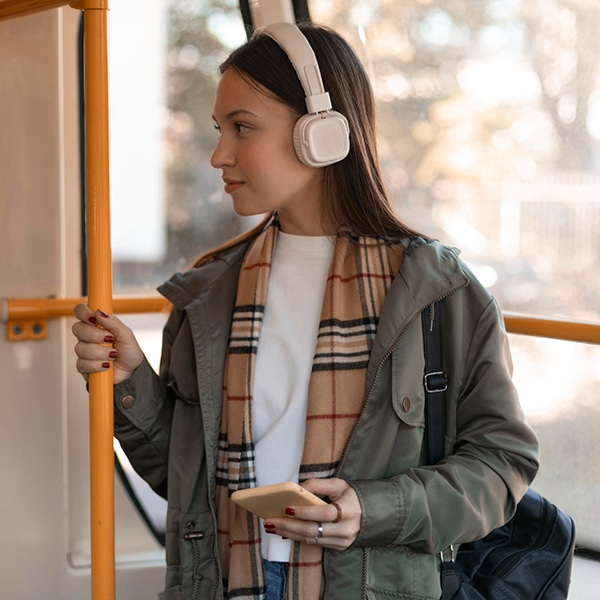The campaign was launched with the aim to help people recognise the signs of sexual harassment and how to offer support to any person who has been targeted by a harasser.
Sexual harassment is a form of violence, most often directed against women and girls in public places. The safety of women and girls is an absolute priority for TfL and this campaign is just one aspect of TfL’s work to ensure everyone is safe and can travel with confidence. It builds on efforts by TfL and the police to tackle sexual harassment and while many people feel strongly about the issue, very few know how they can help it they see an incident of sexual harassment while out and about.
Research from London TravelWatch in 2021 found that 63 per cent of people would feel more confident in responding to a crime if they had more information about how to help.
The campaign includes bold posters, content on LadBible and podcasts. It sets out guidance on how you can safely intervene if you witness sexual harassment, but only if you feel safe to do so:
Advertisement
- Distract with a question
You can help defuse an incident of sexual harassment by asking the person being targeted a simple question, such as ‘Do you have the time?’ - Make a note
If you see an incident of sexual harassment happening, documenting and reporting it can help build a profile of the perpetrator and help TfL and the police stop it from happening again. - Make sure they are okay
Following an incident of sexual harassment, the offer of support can help the person targeted feel less isolated and more confident in reporting it. Check in with the person targeted and ask: ‘Are you OK?’ Megan Yardley, Customer Marketing and Behaviour Change Manager at TfL, says: ‘We’re working hard to create a culture where unwanted sexual behaviour is not tolerated, and that’s why we’re emphasising the importance of reporting any form of sexual harassment. Not only does the campaign speak to offenders and victims, but it also teaches bystanders to recognise the signs of harassment and support victims too.’

To help its compliance officers to deal effectively and safely with any incidences of harassment they may see, TfL has rolled out its zero tolerance to sexual harassment training. This also helps them to deal with any reporting of incidents sensitively. TfL’s Senior Operations Manager, Babatunde Owolabi-Ajao explains: ‘training is an important part of our activity to tackle sexual harassment and support customers and passengers using our transport services. This training ensures that our officers exercise due diligence while undertaking their duties and can safely challenge cases of unwanted sexual behaviours’.
Jeremy Gibson, an Operations Officer, recently completed the training. Talking about the experience, he says: ‘The zero tolerance to sexual harassment training clearly defined the meaning of sexual harassment and explained numerous ways to identify signs of sexual harassment on the network. For example, signs to look out for, identifying different approaches to intervene and offering assistance to the travelling public. In addition, the training also highlighted methods of reporting and provided the correct channels for both staff and customers to report unwanted sexual behaviours. I feel more confident about ‘getting it right when considering a possible intervention in a harassment situation. The training has helped focus my mind on the possible types of behaviours that could cause someone to feel intimated, degraded or humiliated.’












